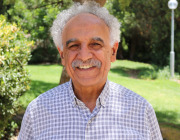Abstract:
The influence of Palestinian physicians’ patriarchal ideology (PAI) and exposure to family violence (EFV) on their beliefs about wife beating was examined. Self-administered questionnaires were completed by 396 physicians. The results revealed that notable percentages of the physicians expressed some level of willingness to justify wife beating, tendency to believe that battered women benefit from beating, and that battered women are to blame for their beating. Nevertheless, between 27 and 59 % of the physicians expressed some willingness to help battered women. The results also revealed that significant amounts of the variance in physicians’ beliefs about wife beating can be attributed to their PAI and to their EFV during childhood and adolescence.The implications of the results for future research, theory development, and training of physicians are discussed.Notes:
Funding Information: The study was partially funded by the Ford Foundation, Cairo Branch, and conducted through the Bisan Center for Research and Development, Ramallah, The Palestinian Authority. Muhammad M. Haj-Yahia, Ph.D., earned his doctoral degree in social work from the University of Minnesota, and is currently Gordon Brown Chair and Professor of Social Work, at the Paul Baerwald School of Social Work and Social Welfare, the Hebrew University of Jerusalem, Israel. His research areas include: rates, risk factors, and mental health consequences of violence against women; beliefs of professionals, students, and ordinary people about wife beating; psychological effects of child abuse and neglect; child sexual abuse; children in war areas; mental health consequences of youth exposure to community violence; and the socio-cultural and socio-political contexts of child abuse and wife abuse. Cindy Sousa, PhD, MSW, MPH is an Assistant Professor at Bryn Mawr College’s Graduate School of Social Work and Social Research. In her research, Cindy investigates the health effects of political and family violence, particularly how violence and resilience are dynamic, cumulative processes that simultaneously occur across multiple levels: individual, family, and community. Raghda Alnabilsy, MSW, Ph.D., is a lecturer at Sapir College and at Ruppin Academic Center in Israel. Here research interests are in womenhhod, girlhood, gender, and the Palestinian family in Israel. Haneen Elias, Ph.D., is a lecturer at the Department of Social Work, Zefat Academic College. She received her Ph.D. from the Paul Baerwald School of Social Work and Social Welfare, The Hebrew University of Jerusalem, Israel. Her research interests focus on sex offenses, child abuse, and child sexual abuse. Publisher Copyright: © 2015, Springer Science+Business Media New York.
